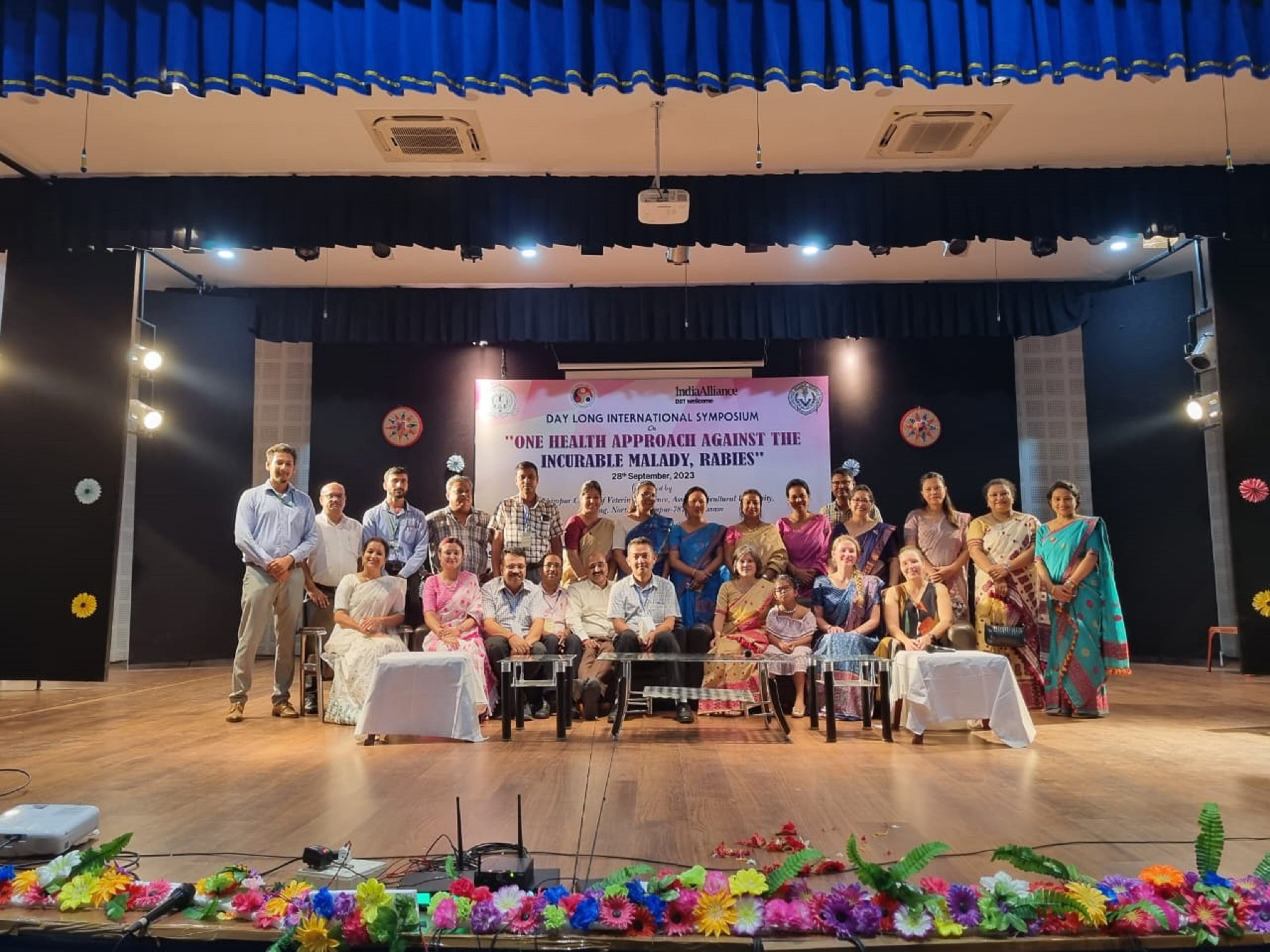World Rabies Day 2023: IIT Guwahati contributes to spreading awareness about the viral zoonotic disease
Publish Date:29-09-2023
World Rabies Day 2023: IIT Guwahati contributes to spreading awareness about the viral zoonotic disease
GUWAHATI, 29th September 2023: Indian Institute of Technology Guwahati(IIT Guwahati) observed World Rabies Day on 28th September 2023 with multiple activities and initiatives to spread awareness about this fatal, yet preventable disease. Dr. Harsh Kumar Tiwari, a veterinary epidemiologist and DBT Wellcome Trust India Alliance Intermediate Fellow at IIT Guwahati, along with his team led the initiative in collaboration with Lakhimpur College of Veterinary Science, Assam. The initiative revolved around this year’s theme, "Rabies: All for One, One Health for all.”
Speaking about IIT Guwahati’s active participation in DBT Wellcome trust India Alliance project, Prof. Parameswar K. Iyer, Officiating Director, IIT Guwahati said, “As part of collaborative initiative IIT Guwahati is committed to harnessing our technical expertise, research capabilities and resources to make a significant contribution in Rabies prevention and control. Our unwavering dedication to this crucial project is in line with our broader mission to address urgent global health challenges.”
Rabies is caused by a virus called lyssavirus that leads to an acute swelling of the brain causing a large number of human deaths worldwide every year of which India shares the highest burden. Bats and wild carnivores are the reservoir of this virus within the wildlife population. but for the infection of humans the dogs are the most essential transmitters and reservoir species. Multiple studies have shown that 99% of the humans are infected by dog bites, and 40% of the victims of rabies-related death are school-going children under the age of 15.
During the day long International Symposium for One Health Approach towards Rabies control in India, a panel discussion was held. The participating panel comprised of Dr. Kakali Bhuyan, from North Lakhimpur College; Ms. Lalita Gwala, President, Joyhing Gram Panchayat, and Head of the Panchayat of Tea Garden communities; Dr. Salome Durr, from University of Bern, Switzerland; Dr. Amrita Sarkar from TRIHMS, Itanagar, and Dr. Archana Talukdar from College of Veterinary Sciences, Guwahati. The discussion was moderated by Dr. Harsh Tiwari from IIT Guwahati. The panel not only explored the larger role that women can play, but also highlighted the existing gaps in the socio-economically weaker communities regarding knowledge and attitudes towards dog-mediated rabies.
Speaking about this fatal disease, Dr. Harish Kumar Tiwari said, ” Dogs, too, are victims of rabies, just like humans. We need to take a comprehensive One Health approach to eradicate dog-mediated rabies. Rabies survives in India because we fail to apply all interventions in the same time and space simultaneously. “
IIT Guwahati is hosting the 5-year DBT Wellcome trust India Alliance project "Implementing a comprehensive One Health approach to eradicate dog-mediated rabies from India". Under this project Dr Tiwari and his team have initiated an study to collect empirical data to understand the dog population dynamics in Northeast India. The likely areas of research would be in Haflong, Bokakhat and Lakhimpur districts of Assam, besides select areas in Guwahati. These select areas will take on pilot project on One Health approach. This data generated will help to model and initiate large scale projects at state and national level.
With the support of the Department of Education, Government of Assam, the team conducted a workshop for school teachers to develop pedagogical resources and tools to promote awareness about rabies and free-roaming dogs among the school children who constitute the most vulnerable section of the population with risk of dog bites and rabies infection.
Highlighting the key steps to eradicate rabies, Dr. Tiwari said, “We have to take a comprehensive and collaborative approach to tackle this deadly disease. Besides tackling the disease in humans through post-exposure prophylaxis (PEPs), mass vaccination of free-roaming dogs is essential to break the transmission cycle of the rabies virus. We also need to focus on three strategies related to dog population management; firstly ensure enhanced awareness about the disease and aggressive promotion of responsible dog-ownership leading to establishing a system of registration and identification mechanism of individual dogs. Secondly, establishment of dog shelter homes and promoting adoption of local dogs, and finally attaching an “economic value” to the Free Roaming Dogs by establishing that they can be as useful to the society as the pedigreed dogs are believed to be.”
The multisectoral team working at IIT Guwahati also comprises the public health researcher Dr Parimala Mohanty, the wildlife expert Ms. Sounika Karmakar, and Mr. Dipankar Gogoi. The team is ably supported through technical expertise provided from University of Bern, Switzerland. The team was joined short term by Ms. Samira Heydtmann, from University of Zurich while Ms. Laura Cunha De Silva from University of Bern will carrying out dog enumeration and habitat selection studies in October and November this year. Dr. Salome Durr who is the mentor for the project lead Dr. Harish Tiwari is also currently visiting the institute and attended the World rabies day at College of Veterinary Science, North Lakhimpur and provided technical advice to the team.























